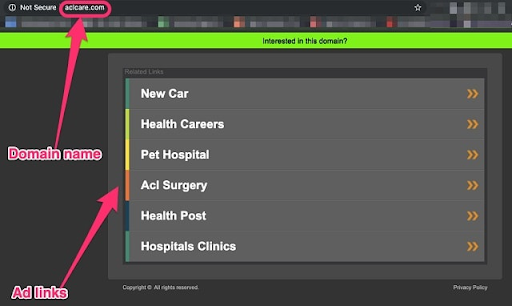What is a Domain Name, and How to Sell a Domain Name?
A domain name is a unique address on the internet that identifies a website or server. It is composed of a series of letters and numbers separated by periods. Domain names are crucial because they help consumers remember and locate websites. They also aid in the prevention of identity theft in corporations and organizations.
– 15 mins

Similar to how you need a street address in a city to locate your destination, you need a domain name to navigate straight to a website. Domain names, which consist of a name and an extension, are a crucial component of the internet’s infrastructure. Users enter your domain name and website’s address into their browsers’ search box to reach it immediately. A domain name is exclusive and cannot be used by another website.
For instance, in the domain name “www.rankhandy.com,”
“www” is the third-level domain (World Wide Web)
“rankhandy” refers to the second-level domain—this is the name of the site.
“.com” is the top-level domain (TLD), also known as a domain name extension.
The top-level domains (TLDs) can be generic, like “.com,” “.org,” or “.net,” or they can be country-specific, like “.uk” for the United Kingdom or “.se” for Sweden.
Let us walk you through understanding what a domain name is and how you can sell it.
Understanding a domain name
A domain name is a text block corresponding to an alphanumeric IP address used to access a website from client software.
An IP address is a special collection of integers that uniquely identifies every website. Your computer uses these numbers to connect with the server hosting the website’s contents. A group of Domain Name System (DNS) servers get a request when visitors type a domain name into their search box. The DNS then returns the IP address of the hosting server for the website, making it reachable.
The purpose of domain names is to simplify the process of recalling websites, as IP addresses can be challenging to remember. Therefore, a website must be given a name so that internet users are able to access it.
Anybody can purchase a domain name. To obtain a name that nobody else uses, you only need to visit a domain host or registrar, choose it, and then pay a nominal yearly cost.
How to sell a domain name?
Many of us sometimes purchase a domain name with the intent of starting a company, product, project, blog, or side business. But as time passed, you either lost interest in the project or never got around to it, leaving the domain unused. Or, in some cases, the domain name you have is no longer relevant.
Under such circumstances, your domain name will end up sitting dormant for years or decades. Instead, you can sell your domain and make money from the unused domain name lying dormant.
Selling a domain name is not a talent that comes easily to everyone. Even though you know how the main procedure operates, there are certain important aspects you should be aware of. Getting the most out of your sale may depend on your ability to understand and utilize them.
Let us explore how to sell a domain name step-by-step, find online marketplaces where you may put your domain name for sale, and be aware of the best strategies to attract customers.

Park your domain name
When you want to sell your domain name—it is essential to register it without connecting it to any internet service. By parking your domain name, you will ensure that you reserve a domain for later use and lower the danger of cybersquatting.
Some parking providers let you earn money by showing ads on landing pages for the domains. People who want to start a company selling domain names might consider this.

Evaluate and set the price of your domain name
Before appropriately pricing a domain name and making money online, you must determine whether the market values it highly. People mistakenly overprice their domains and then wonder why no one ever shows any interest. After all, if a domain has the potential to earn money in the future, people will be interested in purchasing it.
For instance—
- “.com” domain will always cost more money—keep in mind whether your domain ends with “.com” or some other arbitrary suffix.
- Common terms or popular abbreviations in domain names will increase the value of your domain name. See if your domain name is simple to spell or uses a regularly used abbreviation.
- Domains with fewer words—ideally just one—and without hyphens will fetch substantially higher prices. Does your domain contain any additional components, such as hyphens?
- Shorter domain names typically fetch higher prices—is your domain name brief? Or does it have a large number of words?
Domain evaluation tools may assist you in determining your domain’s worth by using an algorithm that considers various aspects. However, these tools may not always provide you with accurate quotes. They are not a genuine measure of worth, but you may use them as a broad indicator.
Domain name brokers can provide you with a neutral evaluation of the situation you’re in. They have extensive business knowledge and can frequently forecast upcoming trends. After doing market research—it’s time to give your domain a price by determining its worth.

Choose the right price strategy when selling a domain name
Each domain marketplace will function slightly differently in terms of your sales choices. However, you’ll frequently come across four price strategies:
- Buy now
- Make an offer
- Through a broker
- Public auction
Buy now option—In the ‘buy now’ option, you choose a price as the domain name’s owner. Making a landing page for the domain is one of the finest methods to inform potential buyers about the domain sale. Anybody with sufficient funds may instantly acquire your domain name at that price. This is the best option if you’re trying to sell a domain name quickly and easily.
Make an offer—The ‘make an offer’ choice necessitates additional manual labor. Instead of making a quick purchase, a prospective buyer might get in touch with you and offer a price. You have three options—accept their offer—reject it or ask for a different one. If you’re willing to spend some time and effort selling your domain, you might choose this approach.
Sell through a broker—A qualified broker may be able to assist you sell your domain name quickly and for the highest possible price when selling a domain name that is in great demand. Most of the time, domain name brokers are paid on a commission-only basis.
Check the terms and conditions as well as any upfront costs before signing a deal with a domain broker. The domain broker could decline to sell your domain name if they don’t believe there will be much demand for it or if the prospective price is too low.
Sell via public auction—A ‘public auction’ enables bidders to compete with one another. After setting a starting price, users submit their offers. The winning bidder is the highest one. This might be a good approach to increasing the price without having to engage in lengthy negotiations if you anticipate that your domain is worth it.
Get your domain listing ready
It’s time to optimize your listing once you decide which marketplace to use. Many merchants post their URLs and quit. However, improving the appeal of your domain will increase the likelihood that it will sell. Potential purchasers may be drawn to a domain listing that has been properly optimized.
For instance—does your domain receive any traffic? What are the current visitor numbers, how much money do you make from monthly ads, and do you also sell the social media identities that go with it? If the domain is quite old, share any existing authorities in your domain.
Create social media profiles for your domains, sign up for communities for domain dealers, and connect with other online merchants. For more engagement, often provide helpful information and participate in conversations on those sites.
You can support the cost and increase the domain’s appeal to purchasers by emphasizing the existing and potential worth.
Use an escrow service to receive the payment
Using an escrow provider is one technique to protect the sale of your domain. A reputable business that serves as an impartial third party is called an escrow. It links the buyer and seller and ensures everyone is on board with the deal’s conditions.
This will assist you in avoiding being the victim of a buyer scam or deception. The domain name will only be transferred to the buyer once the agreed-upon sum has been deposited into an escrow account. The vendor will also get payment once the buyer certifies that they have received the domain.
Some online marketplaces for sellers, such as Sedo, include an integrated escrow system for every transaction made on their website. The cost of doing this will be deducted, but protecting your domain is worth it.

Transfer the domain
After receiving payment, it’s time to transfer your domain to the new owner. You may employ a different procedure depending on how you want to sell your site. However, confirm that it complies with the standards before starting the transfer procedure.
The domain registration or most recent transfer must have occurred over 60 days ago. If you have changed the registrant’s name, organization, or email address during the last 60 days, you won’t be able to transfer the domain name to a new registrar.
Below is a broad description of how it works:
- The seller will provide the authorization code to begin the transfer procedure
- Once the transfer is finished, the seller will release the money from escrow
- Before you start the transfer, confirm whether there are any limitations on how long the money must remain in escrow.

The final thoughts
Although selling a domain might be lucrative—going into the process unprepared may result in far lower earnings. You may make money by establishing your own landing pages or by offering parked or unused domains on auction and marketplace websites.
No matter the platform, this calls for knowledge of the domain market and adherence to best practices. Before you go off on your journey—consider the following:
- Being aware of the value of your domain name
- Making a cautious selection of your domain marketplace
- Showcasing the greatest aspects of the domain to draw in more customers
- Using escrow services to protect your sale
- Observing the final transfer procedure.
You can ensure that your domain name revenues are good by adhering to the recommendations in this comprehensive guide.

Surrinder Pandita is a content writer at RankHandy. He has more than 6 years of experience writing for the marketing, HR, and business sectors and aims to provide high-quality content.





